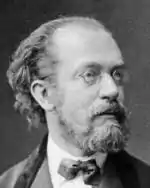Otto Funke
Otto Funke (October 27, 1828 – August 17, 1879) was a German physiologist born in Chemnitz.

He studied in Leipzig and Heidelberg, and in 1852, he became a lecturer of physiology at the University of Leipzig. In 1853, he became an associate professor to the medical faculty at Leipzig, and in 1860, a professor of physiology at the University of Freiburg.[1] One of his better known students at Leipzig was the physiologist Karl Ewald Konstantin Hering (1834–1918).
In 1851, Otto Funke was the first scientist to successfully crystallize hemoglobin (German: Hämoglobinkristalle), which he first called Blutfarbstoff. This work was a precursor to Felix Hoppe-Seyler's important studies of hemoglobin. Funke also performed research of blood formation in the spleen, and investigations into the effects of curare.
Selected publications
- Lehrbuch der Physiologie (7. Aufl. von Grünhagen, Hamburg 1884)
- Atlas der physiologischen Chemie (Leipzig 1853, 2. Aufl. 1858), Supplement to Carl Lehmann's Lehrbuch der physiologischen Chemie
- Kapitel über den Tastsinn und die Gemeingefühle. In: Ludimar Hermann's Handbuch der Physiologie (Bd. 3, Leipzig 1880)
References
- Catalogus Professorum lipsiensium Biographical sketch
- A NASA Recipe For Protein Crystallography
- Parts of the article are based on an equivalent article at the German Wikipedia.